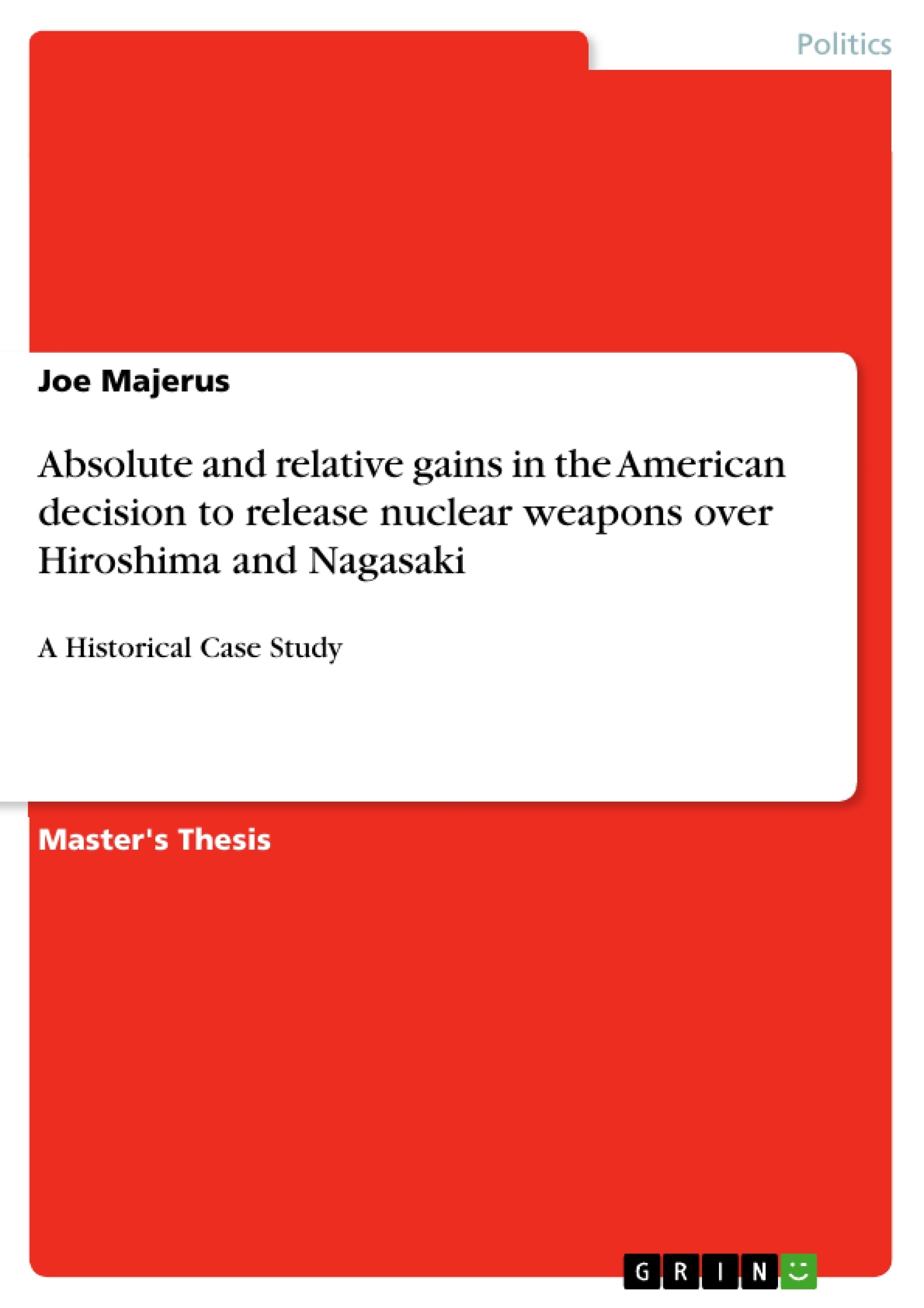The question of whether states pursue absolute or relative gains in international politics has divided neo-realism and neo-liberalism for quite some time now. Thus whereas neo-realists contend that states seek comparative advantages relative to other actors, neo-liberal scholars argue that they are primarily interested in the accomplishment of absolute individual gains. In applying social-constructivist ideas, however, this paper will attempt to demonstrate that such a preference for relative or absolute gains is not naturally predetermined, but inextricably linked to the continual 're-construction' of states' national identities and interests. In other words, it is political actors' own conception and definition of international relations which ultimately determines their concern for absolute or relative gains.
By analyzing the decision-making process of the Truman Administration for using nuclear weapons against the Japanese cities of Hiroshima and Nagasaki in August 1945, this case study will show that American leaders were altogether much more preoccupied with achieving absolute rather than relative gains. Such absolute considerations were simultaneously influenced by the pressures of an anarchic self-help system as well as by specific domestic imperatives and the personal views of individual policy-makers on how to best handle international problems and exigencies. More concretely, American decision-makers believed that only the realization of absolute gains such as swift socio-economic recovery and the creation of a more stable and peaceful security environment would ultimately ensure their country's long-term international position in both absolute and relative terms.
Table of Contents
- Abstract
- Acknowledgements
- List of Abbreviations
- Introduction
- Part I: Theoretical Framework
- 1.1 Neo-realist and Neo-liberal Views
- 1.2 Absolute Gains via Absolute Objectives
- 1.3 Social-Constructivism
- 1.4 Alexander Wendt's Self-Help/Other-Help Antinomy
- Part II: Historical Analysis
- 2.1 Primary Level Analysis / Literature Review
- 2.1.1 Military Imperatives
- 2.1.2 Domestic Concerns
- 2.1.3 Ideological Motivations
- 2.1.4 Geopolitical Considerations
- 2.2 Secondary Level Analysis
- 2.2.1 Domestic Rehabilitation
- 2.2.2 International Peace
- Peace in the Longer Term
- Peace in the Short Term
- Part III: The Primacy of Absolute Gains
- 3.1 Construction of Reality
- 3.2 The United States as a Revisionist Status-Quo Power
- 3.3 American Identity and Interests
- 4. Conclusion
- 5. Bibliography
- 5.1 IR Literature
- 5.2 Historical Sources
- 5.2.1 Primary Sources
- 5.2.2 Secondary Literature
- 5.3 Web Pages
- The importance of absolute and relative gains in international relations theory
- The impact of the anarchic international system on state decision-making
- The role of domestic factors in shaping state preferences
- The influence of individual policymakers on foreign policy decisions
- The historical case study of the American decision to use nuclear weapons against Japan
- The Introduction provides a context for the research, highlighting the ongoing debate within international relations theory about absolute and relative gains. It introduces the argument that the anarchic environment of international relations does not necessarily lead states to prioritize relative gains.
- Part I outlines the theoretical framework, examining the contrasting views of neo-realism and neo-liberalism on state preferences. It also discusses the contribution of social constructivism, which suggests that states' conceptions of international relations ultimately determine their pursuit of absolute or relative gains.
- Part II presents a historical analysis of the American decision to use nuclear weapons against Japan, exploring various levels of analysis, including military, domestic, ideological, and geopolitical factors.
- Part III focuses on the primacy of absolute gains in the American decision-making process, arguing that the Truman administration sought to achieve absolute gains such as economic recovery and a more stable international security environment.
Objectives and Key Themes
This dissertation examines the debate surrounding absolute and relative gains in international relations theory, focusing on whether states prioritize enhancing their position relative to other actors or achieving individual gains. By analyzing the decision-making process leading to the use of nuclear weapons against Hiroshima and Nagasaki, this case study demonstrates that the Truman administration was primarily motivated by achieving absolute gains. The dissertation argues that this preference was influenced by the anarchic international system, domestic pressures, and the views of policymakers on international relations.
Chapter Summaries
Keywords
The main keywords and focus topics of this dissertation include absolute and relative gains, international relations theory, neo-realism, neo-liberalism, social constructivism, the Truman administration, the American decision to use nuclear weapons against Japan, and historical case studies. This work explores the interplay between theoretical perspectives and historical events to provide insights into the complexities of state decision-making in the international arena.
- Quote paper
- Joe Majerus (Author), 2014, Absolute and relative gains in the American decision to release nuclear weapons over Hiroshima and Nagasaki, Munich, GRIN Verlag, https://www.grin.com/document/284040




